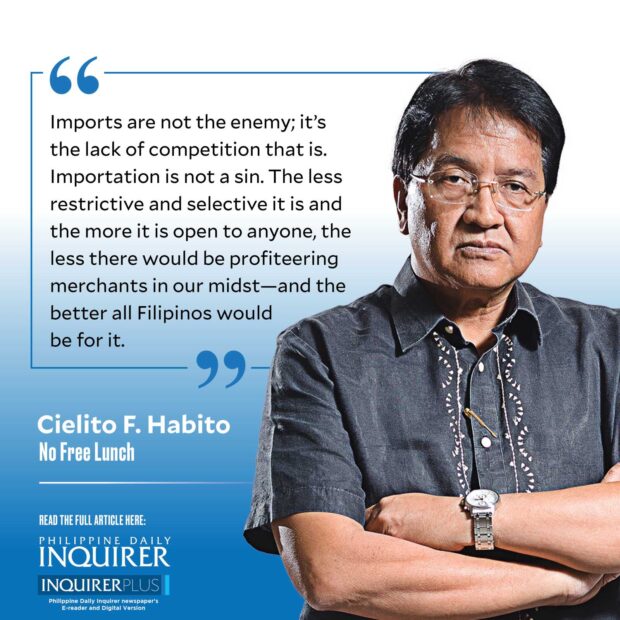Imports are not the enemy
I’ve heard people passionately speak about imports as if they are the most evil scourge on our economy, hence must be tightly controlled if not stopped altogether. When economists like me argue for more liberalized trade to impose greater discipline from the competition, especially in captured domestic markets (which are common here), we are wrongly branded as “import lovers,” as if harboring a treasonous disdain for Filipino producers. Yet it’s precisely the desire to strengthen our own producers and sustainably improve their incomes and welfare that motivates the argument for more open trade.
If one sheds ideological biases, he/she would readily see that imports benefit a nation in terms of economic growth, consumer welfare, and technological progress, and appreciate that an appropriate balance of imports and exports is crucial to achieving a prosperous economy. Imports drive economic growth by providing the inputs domestic producers need. Very few producers can or would wholly rely on domestically produced inputs—meaning capital equipment, raw materials, fuels, and intermediate goods. Even if all needed inputs were available locally, foreign-sourced inputs could provide the producer options to reduce costs and/or improve quality, permitting one to improve productivity and strengthen the ability to compete in both domestic and international markets. This ultimately leads to increased exports and improved economic outcomes in terms of more jobs, higher incomes, and lower prices.
The availability of imports stimulates competition in the local market and puts pressure on domestic firms to innovate, improve their products, enhance efficiency, and ultimately lower costs. This healthy competition fosters productivity growth and a more dynamic and resilient economy. It is this beneficial effect of more liberal trade that our country missed out on with its long-standing protectionist policy against competing imports, particularly on “sensitive” (translation: highly political) agricultural products like rice, sugar, and meat. Our stunted agricultural sector today reflects our government’s utter failure to help our farmers match the productivity of their peers in our neighbors—the unwanted result of decades of shielding our domestic producers from the discipline of the market.
The same competition from imports widens consumer choices by providing access to a broad range of goods and services from around the world. Those in my generation would recall how the era of tightly restricted imports in the 1960s made shopping for PX goods outside the old American bases in Clark and Subic such a prized consumer experience. By the 1990s, Filipino balikbayans and travelers were finding it unnecessary to lug their customary pasalubongs of chocolates and “stateside” household or personal items in their bags; it was easier to buy them here at home. In general, the wider availability of imported goods has uplifted Filipinos’ standard of living by offering consumers diverse options, improved quality, and competitive prices. But more importantly, imports make essential goods like food, medicines, and energy resources (say fuel, batteries, solar cells) more affordable and accessible to Filipinos. Importation of basic commodities stabilizes prices and ensures reliable supplies for consumers, and is vital in times of scarcity caused by natural or man-made calamities. Imports thus play a vital role in ensuring food security and uplifting people’s overall well-being.
Finally, imports facilitate the transfer of knowledge and technology, essential for innovation and technological advancement. Domestic industries benefit from access to advanced technologies, machinery, and expertise from other countries, with which they can enhance their capabilities and improve production processes. This not only boosts productivity but also helps local firms become competitive in the global market.
Imports are not the enemy; it’s the lack of competition that is. Importation is not a sin. The less restrictive and selective it is and the more it is open to anyone, the less there would be profiteering merchants in our midst—and the better all Filipinos would be for it.





















